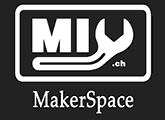3D Printer lab
Printerlab
3d printer are open to the public for your projects and your business
our 3D Printer lab
Open to the public or for Welding courses

DESCRIPTION :
MakerSpace offers courses on 3d printers, 3d printers by hand and on the creation of models in 3d. We also offer courses on related technologies and development of prototyping machines. The MIY MakerSpace 3d printer room is about 40 m 2 and has 3 primary machines that customers can use in-place without booking or rent for the weekend.
LIST OF MACHINES :
- 3d pen style 3d printers
- 2 x micro Make 3d printer
- Ultimaker 3d Printer
3D printing, or additive manufacturing, is a technology that makes it possible to manufacture three-dimensional objects from a computer file, generated – for example – using 3D modeling software like we have in our 3D Printer lab.
In an additive manufacturing process, the desired object is formed by adding successive layers of material, in order to fill all the “pixels” that form it, following the coordinates provided by the 3D file. Each layer of material can be thought of as a very thin horizontal slice of the object to be manufactured. We could therefore imagine that a 3D printer is none other than a traditional printer, with the only difference being that it is capable of printing in three dimensions, and using materials other than ink and paper, including plastic, ceramics, and metal.
How does a 3D printer work?
First of all, you have to start by creating a virtual model of the object to be manufactured, this can be done using computer-aided design (CAD) software, if you want to design a new object, or by using a 3D scanner that will take care of creating a 3D model of an already existing object, and that you want to replicate.
Once the 3D model is created, it will need to be converted to . STL or . OBJ so that it can be recognized by the printing software. The 3D model is then cut into hundreds or even thousands of horizontal layers. It is this “cut” file that will be provided to the printer, and will give it the instructions and the path to follow during the entire operation. Also, it should be noted that before printing an STL file, it should first be checked that it does not contain any errors: holes in the model, or unconnected surfaces for example. These errors are particularly encountered in models obtained with a 3D scanner. Software such as Netfabb or Meshmixer can detect and correct these errors.
Although the principle of additive manufacturing remains valid for all 3D printers available so far, the methods and technologies used vary from one model to another. The most common are deposition printing, stereolithography, selective laser sintering, PolyJet, and DLP. Come to our 3D Printer lab for more information or to take a course in 3d printing
Services:
- Coaching
- Advice and development
- Rental of on-site 3d printers
- Prototyping
- Subcontracting
- Activities for the holidays
Les Cours:
- Private course
- classes max 2-3 people.
- Beginner, intermediate, professional
- 3d printer
- Children’s courses child 3d
- Summer camp 3d printer
- Modeling 3D
- development of a model from a file or an idea

Activities and parties for children, adults or families

Rental on-site 3d printer and with membership you only pay the wire

Rapid prototyping of plastic parts for small projects or inventions

Learn 3d: take a class on 3d design software
3D
printer lab
Applications

Hand printers, draw your projects or works of art with a special pen

Create a machine yourself a real 3d printer with your specs: Court of base to make or get a machine

